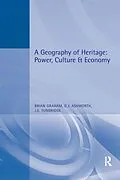The concept of heritage relates to the ways in which contemporary society uses the past as a social, political or economic resource. However, heritage is open to interpretation and its value may be perceived from differing perspectives - often reflecting divisions in society. Moreover, the schism between the cultural and economic uses of heritage also gives rise to potential conflicts of interest.
Examining these issues in depth, this book is the first sustained attempt to integrate the study of heritage into contemporary human geography. It is structured around three themes: the diversity of use and consumption of heritage as a multi-sold cultural and economic resource; the conflicts and tensions arising from this multiplicity of uses, producers and consumers; and the relationship between heritage and identity at a variety of scales.
Autorentext
Professor of Human Geography, University of Ulster, Coleraine, Northern Ireland., Professor of Heritage Management and Urban Tourism, University of Groningen, The Netherlands., Associate Professor of Geography, Carleton University, Ottawa, Canada.
Inhalt
Heritage and geography Part 1 The context The uses and abuses of heritage Part 2 Heritage and the cultural realm: its social and political uses Heritage, power and identity Heritage and national identity Multicultural heritage: from dissonance to harmony? Part 3 The economic uses of heritage Heritage and economics: an ambiguous relationship Heritage in economic development strategies Part 4 Heritage and scale Heritage and scale I: the national Heritage and scale II: the local Heritage and scale II: from the national to the continental management of heritage Heritage and scale II: towards a global heritage Towards an integrated geography of heritage.
